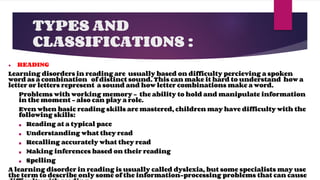This document discusses learning disorders, which are information processing problems that prevent people of average or above average intelligence from effectively learning and using skills. It identifies the five most common types of learning disorders as dyslexia, dyscalculia, dysgraphia, visual processing disorder, and nonverbal learning disorder. Each type affects different skills such as reading, math, writing, visual processing, and interpreting nonverbal cues. Causes may include genetics, brain damage or dysfunction, biochemical imbalances, and environmental factors. Signs and symptoms vary depending on the type of learning disorder. Treatment involves specialized education, therapy, accommodations, and sometimes medication. Nurses should effectively communicate with patients, assess their needs, allow more time, and





























